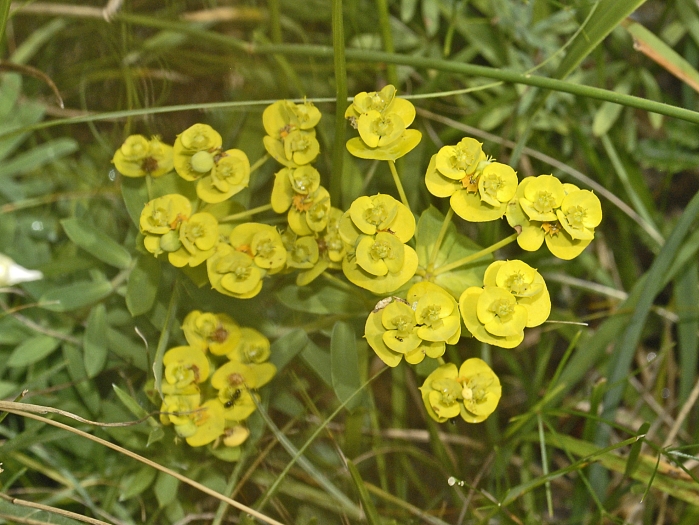Wood Spurge
(Euphorbia nicaeensis)
Wood Spurge (Euphorbia nicaeensis)
/
/

Hectonichus
CC BY-SA 3.0
Image By:
Hectonichus
Recorded By:
Copyright:
CC BY-SA 3.0
Copyright Notice:
Photo by: Hectonichus | License Type: CC BY-SA 3.0 | License URL: https://creativecommons.org/licenses/by-sa/3.0 | Uploader: Hectonichus | Publisher: Wikimedia Commons | Title: Euphorbiaceae_-_Euphorbia_nicaeensis.JPG | Notes: |




















































Estimated Native Range
Summary
Euphorbia nicaeensis, commonly known as Wood Spurge, is a semi-deciduous perennial herb native to open woodlands and rocky hillsides in Europe and Asia Minor. It typically reaches a height of 20–50 centimeters (7.9–19.7 inches) with erect, simple stems that are ocher-orange and often leafless, bearing leaf scars along most of their length. The leaves are glaucous gray, narrowly lanceolate to oblong or ovate, and measure 10–75 millimeters (0.39–2.95 inches) long, arranged in apical rosettes. Wood Spurge produces inconspicuous yellow-green flowers surrounded by showy, bright yellow bracts that give the appearance of petals, blooming from June to August.
Wood Spurge is valued for its drought tolerance and the striking color contrast between its foliage and bracts, making it a popular choice for rock gardens, borders, and as ground cover. It thrives in full sun to part shade and prefers well-drained soils. While it requires low amounts of water once established, it benefits from occasional watering during prolonged dry spells. Gardeners should be cautious as all parts of the plant contain a milky sap that can be irritating to skin and toxic if ingested. It is also recommended to wear gloves when handling Euphorbia nicaeensis to avoid skin irritation.CC BY-SA 4.0
Wood Spurge is valued for its drought tolerance and the striking color contrast between its foliage and bracts, making it a popular choice for rock gardens, borders, and as ground cover. It thrives in full sun to part shade and prefers well-drained soils. While it requires low amounts of water once established, it benefits from occasional watering during prolonged dry spells. Gardeners should be cautious as all parts of the plant contain a milky sap that can be irritating to skin and toxic if ingested. It is also recommended to wear gloves when handling Euphorbia nicaeensis to avoid skin irritation.CC BY-SA 4.0
Plant Description
- Plant Type: Shrub
- Height: 1-1.5 feet
- Width: 0.5-0.8 feet
- Growth Rate: Moderate
- Flower Color: Yellow, Green
- Flowering Season: Spring, Summer
- Leaf Retention: Semi-Deciduous
Growth Requirements
- Sun: Full Sun
- Water: Low
- Drainage: Medium
Common Uses
Bee Garden, Bird Garden, Border Plant, Butterfly Garden, Deer Resistant, Drought Tolerant, Groundcover, Low Maintenance, Potted Plant, Rabbit Resistant, Rock Garden
Natural Habitat
Open woodlands and rocky hillsides in Europe and Asia Minor
Other Names
Common Names: Nice Spurge, Honey-Flowered Spurge, Pannonische Wolfsmilch, Nizza-Wolfsmilch, Oleandertörel
Scientific Names: , Euphorbia nicaeensis, Euphorbia gonzaloi, Esula nicaeensis, Euphorbia anselmii, Euphorbia nicaeensis var. acuminata, Euphorbia pumila, Euphorbia seguieriana var. nicaeensis, Galarhoeus nicaeensis, Tithymalus nicaeensis,
GBIF Accepted Name: Euphorbia nicaeensis All.